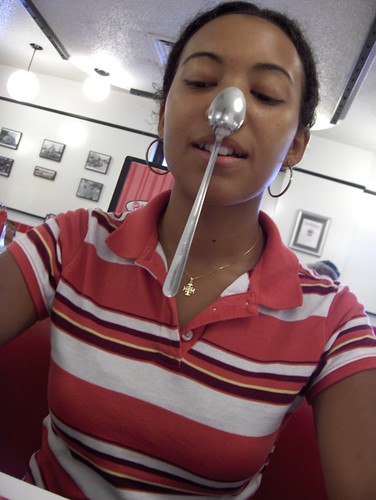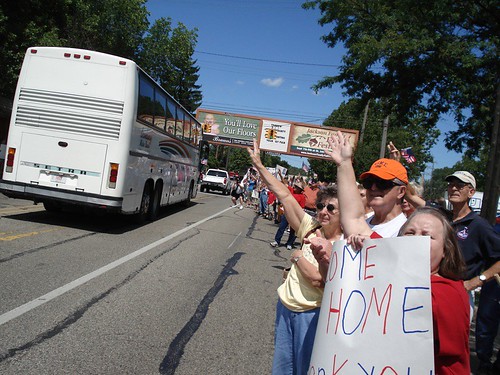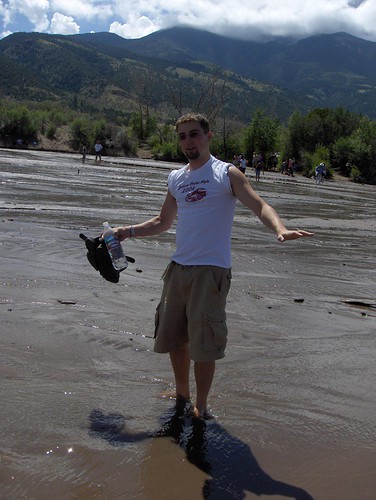
Let's say you play the lottery this weekend, and win $50 million.
Now what?
A
post on Consumerist.com got me thinking about what I would do if I ever hit it big. Now, first of all, it's a rare day when I step into a store and buy a lotto ticket. Usually my grandma has to tell me what the jackpot is, and I'll mosey in and grab one. But then I forget about the drawing, and don't even check my ticket until weeks later.
I think we've all had those "what if" moments, right? Some folks I know even have every last dollar spent, before it even hits their hand. Now that's wishful thinking.
The typical response includes - and I'm just guessing - paying off debt, buying parents a house/car, buying self a house/car, traveling, and investing. Those are pretty standard responses.
But the funny thing is, that almost never happens. Those of us halfway decently educated on financial matters aren't the ones playing the lottery;
we know what the odds are, after all, and wouldn't be caught dead using Power Ball as an investment tool.
Everyone, I'd bet, has that fleeting sense of euphoria when they buy the ticket that could win $140 million, though. "Wouldn't it be nice?" we ask ourselves, knowing full-well we're living in fantasy. Unicorns will spring, full-grown, out of my butt as I get struck by lightning.
Then I'll win the lotto.
Tons of neurons have wastefully fired on this subject. So - just for fun - we'll fire some of our own. Ready?
Let's say, by picking the numbers 8, 12, 16, 21, and 27, you hit the jackpot and win $13 million - a modest sum, perhaps, but a better chance than winning anything over $100 million.
Now there's a choice: take payments (about $312k/year, after taxes) or take a lump sum (about $5 million after taxes - calculated
here). Either way, with a $300,000 annual income or as the new recipient of a cool five mil, you're sitting pretty well off.
Conventional wisdom holds that the lump sum is the smarter choice, because you - as an investor - can better manage your money and help it grow over time. So let's figure $5 million as the payout, after taxes, and after they give you the big cardboard check and take pictures, you're on your own.
There are actually
companies out there that do nothing other than cash-out annuities. I listened to an interview with a guy on "This American Life" who started with one of those companies, and the misery and desperation he saw broke his heart. Lotto winners usually end up spending all their money before they even get it, so this guy's company would swoop in to the "rescue" and buy out the winner's remaining funds.
Well, in the case of our thought experiment, we ignore those bastards. Because the first thing we're going to look into is some kind of trust or LLC that could give us protection from taxes. And frankly, a little time to cool off wouldn't hurt. We'll say a month or two. It's not that long to wait.
Now, we've got $5 million sitting in the bank. If we just left that money alone, at a modest rate of return - say, 5% - we could earn $250,000 a year. Which is actually less than we'd receive if we took the payment schedule from the state lottery association. So we won't do that.
Instead, let's do some good with our new found wealth. First, we think of family.
My dad's house ($150,000) would be paid for. And a car or truck for him and his girlfriend ($40,000). My sister would get a modest house and car ($150,000). My grandma's house would be paid for, and she'd get a new car and a new garage door ($166,784 - we'll round to $170,000).
That's $510,000 spent, about $4.5 million left over. What's next?
Debt. My car ($6,000), my student loans (about $17,000), and a few things here and there ($5,000). Plus my roommates debt (unknown, but we'll say $2,000) and a new car for him ($20,000). Katie gets a new car, too ($25,000).
That's $75,000, or $585,000 all together. Not too shabby. We're still left with $4.4 million.
Next we'll say a new house in a decent neighborhood, but nothing too fancy. About $250,000 should do us. Plus a BMW of some sort ($50,000), a boat ($20,000), and a Mac Pro with 30-inch Cinema Display and Adobe Creative Suite 3 ($4,000).
That's $324,000, or $909,000 all together. We'll round that up to a million, just to be safe, leaving us with $4 million.
Now the Bible says to give 10% off the top of your income to tithe. If I start with my original winnings, that would be about $500,000. We'll double that. I would donate, flat-out, $100,000 each to the Juvenile Diabetes Association, the Interfaith Homeless Shelter here in Jackson, a west-coast environment group (here, here, and here, perhaps), the Rotary Foundation, and an organization I would set up myself to help get people out of hard times. Maybe we'd call it the "You're in trouble, so here's $1,000" fund. With few questions asked.
With the half-million left over for charity, I'd do something huge. I'm not sure what, but it would be in the style of the Carnegie Library project. Something that has value, and lasting impact, on small towns all across the country. I'm thinking internet-ready Macs in the hands of inner city school kids, or a cure for diabetes, or kids-themed, hands-on science museums in small farm towns, or a non-profit veterans health center - fully funded, unlike our current government - that gives needed health and psychological aid to our soldiers. These are just off the top of my head.
Now there's $3 million left. For kicks, let's put a million dollars into travel, take a year off, and go see the world. The whole thing - all seven continents, and the big islands. Months in Europe, and India, and a week or two in the Canadian Rockies wilderness, living in a cabin and eating off the elk I'd kill with sticks and rocks and my two bare hands. I'd stop moving when the money ran out.
Exhausted, I'd put away the rest of the $2 million and live off a steady interest. Even earning a modest 5% in some internet savings account, I could make $100,000 a year, which is more than enough. But if I invested aggressively - say, at 10% - I could live off the $200k/year.
Until I'm dead.
In the meantime, I'm sure I'd give plenty of money to
my fraternity and maybe to Adrian, if they'd ever get their act together. But I'd do it anonymously, because nothing ticks me off more than those giant cardboard checks and someone's name slapped on the side of a building. If you're going to give, to it for the right reasons.
All of this is dreaming, of course, but I think a plan always helps - you know, just in case.
A plan for everything, in fact, because there could come a time when you have to make some split-second decisions. As methodical as I am, I'd have to do it right.
Now give me a fortune cookie: I need some numbers to play...
----------------
Now playing: Milow - Waking Up
http://foxytunes.com/artist/milow/track/waking+up




















